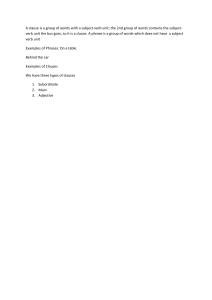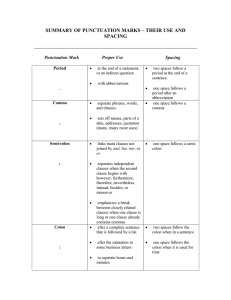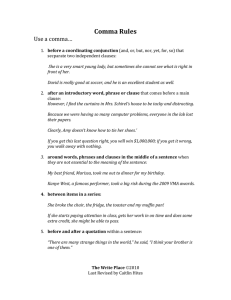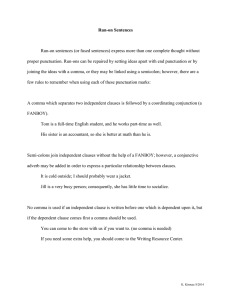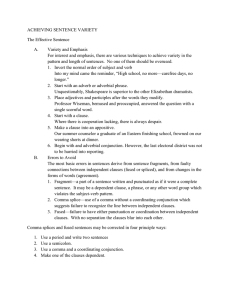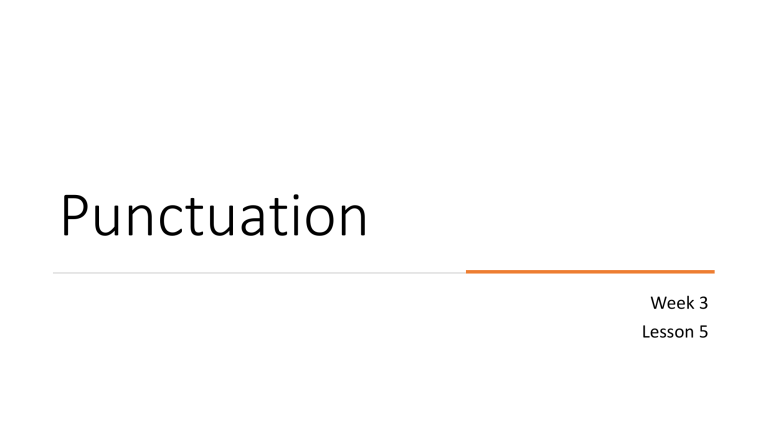
Punctuation Week 3 Lesson 5 Comma 1. Subordinate clauses 2. Relative clauses 3. …, which is why … 4. … not only … but also … 5. Linking words 6. Clauses with and, but, so, yet, nor and or 7. Length of clauses 8. Items in a list 1. Subordinate clauses The subordinate clause comes at the beginning of a sentence: • If the government decided to improve the public transportation system [,] fewer people would drive to work. The main clause is at the beginning: • Fewer people would drive to work if the government decided to improve the public transportation system. Further examples: • Although gender equality has made a lot of progress [,] some school subjects remain male dominated. • Some school subjects remain male dominated although gender equality has made a lot of progress. • As the influx of visitors in the world's major cities has reached crisis point [,] global tourism urgently needs to rethink itself. • Global tourism urgently needs to rethink itself as the influx of visitors in the world's major cities has reached crisis point. 2. Relative clauses A non-defining relative clause: • School children [,] who take physical exercise regularly [,] often have a healthier lifestyle than their parents. A defining relative clause: • School children who take physical exercise regularly tend to perform better in exams than those who do not. 2. …, which is why… Remember to use a comma before which is why, and also before which used to refer back to a whole clause: • All too often, prisons fail to offer suitable rehabilitation programmes [,] which is why many inmates have difficulty integrating back into society. • Many people actually panic when they are unable to be online [,] which is a clear sign of their addiction to social media. 5. … not only… but also… Do not use commas in sentences with … not only… but also …: • The lack of online security is a matter of considerable concern not only for businesses but also for private internet users. 4. Linking words • When they are used at the beginning of a sentence, those linkers are always followed by a comma: • A relatively small number of brands have imposed themselves on the world stage. As a result [,] many local businesses have had to close down. • Sports lessons can develop a child's interest in exercise and outdoor activities. Besides [,] they can also be effective in combating overweight and obesity. • Over the past 50 years, there has been a growing awareness of ecological issues. On the other hand [,] the amount of plastic that is thrown away has led to an environmental disaster. 4. Linking words The main linkers that can be used at the beginning of a sentence can be grouped as follows: Result Cause Addition As a result, … Consequently, … Therefore, … Because of [N(P)], … Therefore, … Besides, … Furthermore, … Moreover, … Linking words Some of the linkers in this table can also be used in the middle of the sentence. Note that when this is the case, a comma is needed before and after the linker: • A good university degree is essential when applying for an academic job. In business [,] however [,] soft skills and experience are usually more useful. • Some people argue that the only purpose of business is to make a profit. Such a stance is [,] in my view [,] short-sighted as well as unethical. 5. Clauses with and, but, so, yet, nor and or Comma is used to separate two main clauses linked with and, but, so, yet, nor and or. This is particularly the case when the clauses are long and quite distinct in meaning: • Parents often spend a considerable amount of time watching television, and their children waste time chatting with friends online instead of doing their homework. • High-rise apartment blocks offer moderately priced housing in urban areas, but the lack of outdoor spaces makes many people search for other types of accommodation. • Few prisons offer adequate rehabilitation programmes, so prisoners have problems when they return to the community. However, the comma may be omitted if the clauses are very short and closely linked: • Children watch too much television and do not take enough exercise. • Many people like nature but would not like to live in a village. • Many children wish to attend school yet are unable to do so. 6. Length of clauses There are no fixed rules in English grammar to distinguish how many words constitute a long clause or a short clause. This means the writer must decide if the length requires punctuation or not. As a general guide: a) the comma sometimes signals the place where we might take a pause to breathe if we were speaking the sentence out loud. b) if the clause is very long, it might be easier for the reader to have the comma present in order to distinguish one clause from the other. 7. Items in a list Use a comma to separate items in a list: • Even in developed countries, many people cannot afford the bare necessities of life, such as food, shelter, proper clothing and medical care. Between the last two items in a list, a comma is not usually used except if the items are long: • Schools are places where not only subjects should be taught but also human values such as solidarity, team spirit, compassion for the suffering of all creatures, and readiness to help anyone in need. Colon On rare occasions, it may happen that you need to use a colon. A colon is used to introduce items in a list: • There are three things we can easily do without if we want to protect our environment: CFCs, fossil fuels and single-use plastic bags. You can also use a colon to introduce an explanation: • Our planet is on the verge of an ecological disaster: sea levels are rising, the ozone layer is depleted, and an increasing number of plant and animal species are facing extinction. Apostrophe We use an apostrophe for two main reasons: in contracted forms (e. g. can't / we're / won't / hasn't, etc. ) and after a noun to indicate possession. As you must not under any circumstances use contracted forms in academic essay writing, only the possessive marker is of interest here. • Unless we stop depleting the Earth's natural resources, we will cause irreversible damage to the environment. Time to Practice Handout Reflection • "What are some key takeaways from today's lesson on punctuation?" • "Can you recall a specific sentence structure or punctuation rule we discussed today?" • "How do you think improving your punctuation skills will benefit your writing?"
